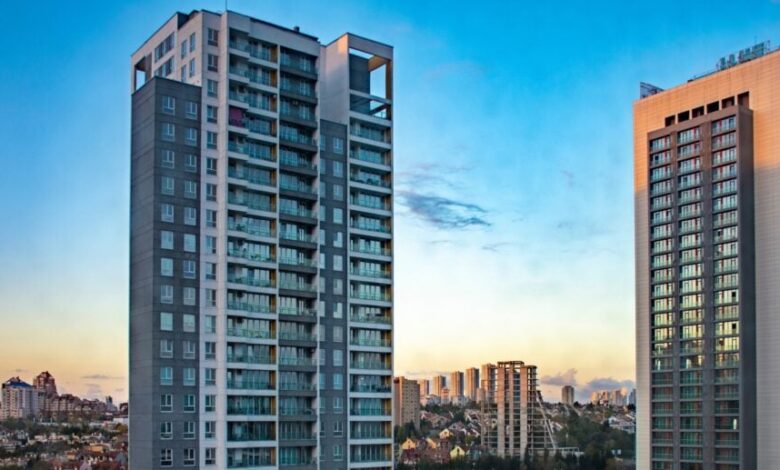A Massive Commercial to Residential Conversion is Taking Shape Nationwide—Here’s What Investors Should Know

From the boardroom to the bedroom, faced with empty offices as remote employment continues to starve cities of workers, a massive nationwide repurposing is underway to transform workplaces into residential spaces.
According to a report by RentCafe, “adaptive reuse”—the term for this process—will see 151,000 new apartments take shape this year, up from 122,000 last year, representing a 24% increase and a 17.6% increase from the year before.
The trend is much needed to stop building owners from going broke and cities from losing much-needed tax revenue. A study completed in November 2022 by researchers at the NYU Stern School of Business and Columbia University estimated a $664.1 billion reduction in real estate asset values from continued remote work trends.
New York and LA Head Conversions
Most of that number involves repurposing hotels—an easier transformation than remaking office spaces, which are also being converted, with Manhattan leading the charge. A small number involve converting industrial buildings such as factories. By far, the largest project in Manhattan is 525 Lexington Avenue. The building now houses 655 student apartments.
Los Angeles has 5,881 units scheduled for conversion this year, while Manhattan has 4,363. Office conversions are at the top of many cities’ agendas. Because of the additional considerations, such as windows, plumbing, and electrical revisions, office conversions take longer than hotel conversions. However, they are still considered an environmentally friendly alternative to razing buildings and starting from scratch.
“The process minimizes the environmental impact associated with demolition and the production of new materials, making it an eco-friendly approach to design and construction,” Doug Ressler, manager of business intelligence at commercial real estate data firm Yardi Matrix, said in the press release about the RentCafe report. “Although these [office] buildings pose challenges for conversion into residential spaces due to factors like building age, size, configuration, and location, repurposing them helps alleviate the shortage of rental units at diverse price points, especially in areas where vacant or underused buildings are prevalent.”
Tax Revenue, Housing, and Vitality
The immediate advantages of additional city residential spaces include:
- More tax revenue.
- Vibrant 24/7 communities.
- Booming business for nearby restaurants and businesses.
- A much healthier urban ecosystem.
About 11% of U.S. office buildings are good candidates for conversion, but one of the prohibitive issues is expense. The resultant apartments or condos would need to be high-end to pay for the undertaking. This would do nothing to alleviate the affordability crisis many cities are facing.
However, a study from Gensler indicates that office conversions are less than one-third of the cost of new construction. Couple this with developer incentives, such as new legislation that provides a 20% credit for qualified property conversion expenditures with developers—providing at least 20% of the resulting units are affordable housing to qualify—and large-scale office conversions could provide a way to revitalize city centers, offering much-needed affordable housing in the process.
The Benefit for Real Estate Investors
In the short term, the additional tax revenue allows cities to function better. It means residential landlords in the city boroughs won’t see a spike in their real estate taxes, and essential city services such as sanitation, police, education, and fire departments will be better funded, making cities better places to live. Also, adding affordable, much-needed inventory to the market could stabilize and even decrease exorbitant, escalating prices, allowing more people to get onto the housing ladder and create more well-balanced cities of full-time residents.
In the long term, as cities become desirable places to live and socialize, as has happened in cities like Detroit, the knock-on effect benefits the entire city, resulting in appreciating real estate values.
Investing in City Condos
Investing in condos is an excellent strategy for passive income. According to the National Association of Realtors, the median sales price of single-family homes rose 5.6% to $412,100 from April 2023, while the median sales price of condominiums increased 5.4% to $365,300.
Though city condos could be pricier than they are elsewhere, the fact that owners pay a maintenance fee means the public areas of the building and grounds and amenities are well maintained, saving an investor the headaches associated with single-family homes. As with other real estate types, condos appreciate while providing cash flow and tax breaks.
The downside of condos is that because of the minimal upkeep, overseas investors often buy them in all-cash deals as a haven to park their money while living elsewhere, leaving many buildings half-occupied.
The Big Picture
According to commercial real estate brokerage JLL, repurposing office buildings for residential and other in-demand uses could provide a windfall for commercial real estate investors. Indeed, 90% of global real estate investors believe a former office’s best uses would be residential assets.
Other uses mentioned include:
- Industrial storage and data centers.
- Hospitality and leisure.
- Student or senior housing.
That said, assuming the construction aspect of a conversion could be achieved, financial hurdles could still pose a problem.
“If an office was acquired using an office-specific investment fund, pivoting to a different use often requires first selling the property and securing alternative financing,” Raphaelle Bour, lead project manager of Work Dynamics, said on the JLL website. Noting the number of cities getting on board with tax incentives and zoning allowances, Bour added: “Policymakers are also simplifying previous conversion hurdles, hoping to reduce the number of stranded assets whose upgrade costs outweigh their worth.”
Value-Add Propositions of Older Buildings Can Offset Risk
“There’s an opportunity for investors to acquire vacant office buildings, structure the repurposing, and establish new operators,” says Bour. “They can then offer assets to the market with, say, a decade of secure cash flow, something which is currently in high demand—and many large investors are creating diversified funds for this type of operation.”
Final Thoughts
Repurposing office buildings offers opportunities for both smaller residential and more prominent commercial investors. For owners of small multifamily buildings, a big city’s ongoing healthy social and financial ecosystem means a plentiful supply of tenants, the upkeep of essential services, and increasing housing values.
For passive investors, the supply of new condos to the market offers the opportunity to invest in a hands-off, appreciating asset. Depending on your city’s short-term rental rules, this asset could be used as an Airbnb, allowing you to stay in your residence when you are in town.
For larger-scale investors and syndications, the myriad of potential adaptive uses for older office buildings means that not only will there be financial benefits for a value-added proposition, but also the chance to choose a future-proof, in-demand business such as a data center that is not tenant-dependent and thus less risky than relying on constant upkeep, monthly rents, and high occupancy numbers.
Note By BiggerPockets: These are opinions written by the author and do not necessarily represent the opinions of BiggerPockets.
Source link





